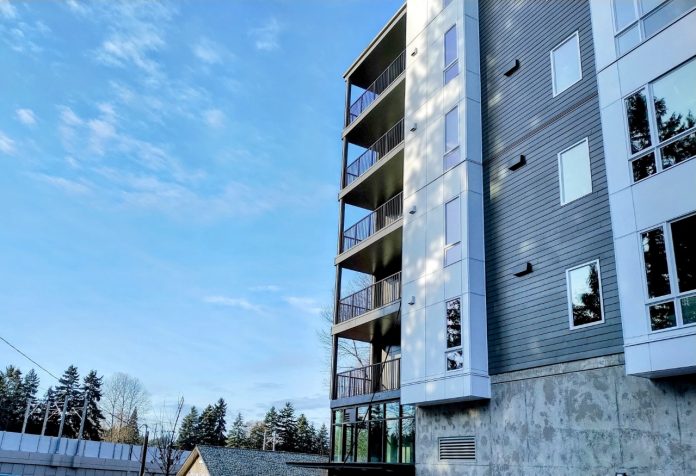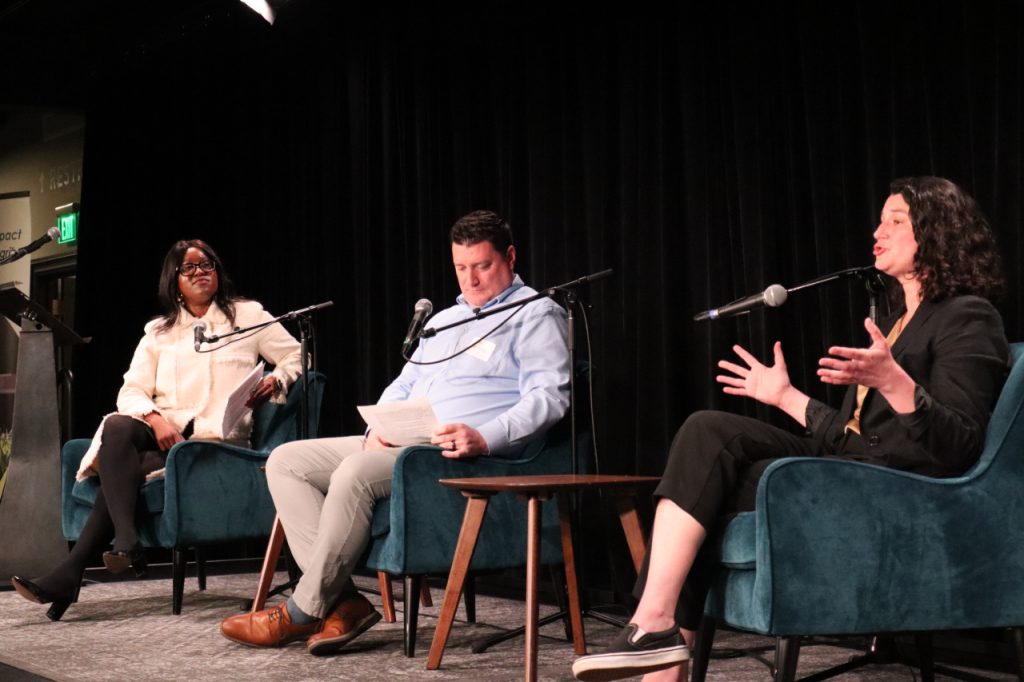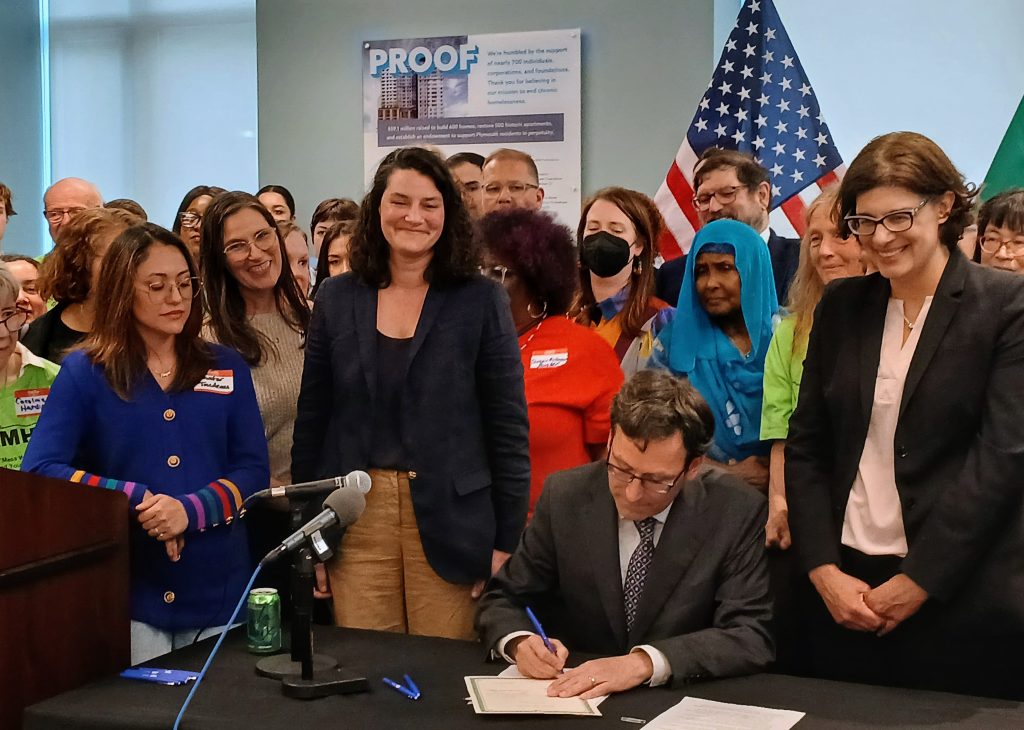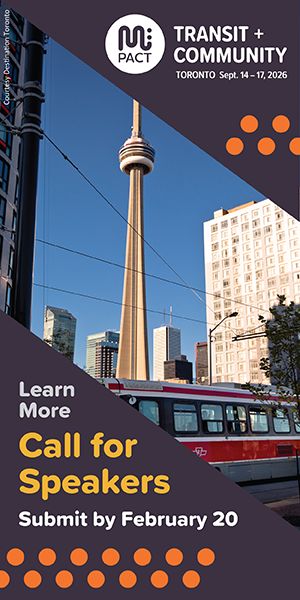
Over the past few weeks, as Governor Bob Ferguson added his signature to hundreds of bills approved during the 2025 legislative session, it became clear that “Year of Housing 2.0” is a moniker that is going to stick around. Over the 105 days lawmakers were in Olympia, they sent over a dozen housing-related bills to Ferguson’s desk: policies running the gamut from wonky subdivision reform to a sweeping transit-oriented development (TOD) bill.
The impact of the 2025 session will be felt for years to come, with a myriad of long-discussed reforms finally getting across the finish line, from tackling parking mandates and lot-splitting, to historic landmarking, condo liability, rent stabilization and holding local governments accountable for housing production. But lawmakers are already looking ahead to the next set of issues to tackle when it comes to getting homes built — policy areas where solutions have been proven to be even more intractable.
Last week, the Housing Development Consortium (HDC) celebrated its tenth-annual Affordable Housing Week, and invited Senator Emily Alvarado (D-34th, West Seattle) to talk about the progress made this year. The former Director of Seattle’s Office of Housing, Alvarado is one of the most outspoken state level policymakers on the issue of housing, and she was the architect of this year’s hard-fought rent stabilization bill.
Attendees of the HDC’s all-morning kickoff session were mostly housing finance and advocacy professionals. After offering her take on why the legislature has become so focused on the issue in recent years, Alvarado pivoted to her vision of where the legislature needs to go from here.
“I think you’ve seen that the state has recognized that it needs to step up, because we have had local governments that have completely stood in the way of us getting that the housing that we need, between restrictive zoning and permitting processes that take too long, and regulatory burdens that make it difficult, between policies that have made it so you can’t site permanent supportive housing,” Alvarado said. “Locals have made it very hard, and locals have accountability that makes it hard for them to be brave in the space of housing.”

Alvarado touted the increase in direct state investment in housing over the past decade-and-a-half, with the amount added to the state’s Housing Trust Fund averaging only around $50 million per year in 2011 compared to a $782 million investment in housing over the next two years. But she called for bolder, more out-of-the-box thinking around how to pay for the more than 1 million homes state experts say will be needed in Washington by 2044.
“I think we need to dramatically rethink the way we finance housing in America and in this state and in this city,” Alvarado said, calling for scaling up resources and trying new approaches. She alluded to HDC’s early opposition to Seattle’s social housing developer ballot measure in 2022, which seemed to stem from a fear it would sap resources and support from conventional affordable housing. By the time that a companion initiative to provide direct funding for that public developer made it onto the ballot in 2025, HDC had become a supporter. The proposition scored a 26-point victory in February.
“And say what you want, because I know HDC has had different perspectives on this,” Alvarado said. “I’m really wanting to shout out to those folks who are bringing social housing to the discussion, because even if that’s not the right way, we need to do something different for how we finance housing.”
Alvarado noted that despite the big moves the legislature made around housing both in 2023 and 2025, fewer units are being permitted right now compared to years like 2018 — largely due to high interest rates keeping privately-financed projects from moving forward.
“That private market constraint is a problem that we face, and on the nonprofit and affordable side, we’re reliant on these sources that leverage, leverage, leverage, leverage — [a] totally inefficient waste of money to leverage every source of government,” Alvarado said. “What does it look like to actually put capital out there to get the housing built that we need? And so I think we need something big and bold, whether it’s West Coast financing of housing, whether we take on the supply chain and we take on development agreements to do something, whether we use the state’s balance sheet — how are we getting to the next level of financing that’s actually going to unlock what we need?”

Senator Jessica Bateman (D-22nd, Olympia), chair of the Senate’s housing committee, told The Urbanist she’s also interested looking at using state finance capacity to ramp up public housing construction. Two years ago, Governor Jay Inslee proposed to go to the voters for approval to issue $4 billion in bonds for subsidized housing, a move that the legislature declined to advance after concerns were raised over the potential impact on the state’s credit rating.
At the county level, using bonding capacity to fund social housing is an idea that is still percolating, after the King County Council approved a motion from County Councilmember Girmay Zahilay directing the County Executive’s office to explore the idea.
Bateman also pointed to additional work the legislature could do to speed up market-rate development.
“Within the control that we do have, how can we make housing construction happen much more efficiently? We’ve done some work on permit review or permit timelines, but we still have a lot more progress on that,” Bateman said. “And then, what new emerging technologies do we have that could be a potential for really breaking through on either the construction of housing the creation of housing — like manufactured housing, the new types of housing development that they’re doing in factories that can build a house in a week.”
One of the few housing bills that didn’t advance across the finish line this year was HB 1443, which would have required cities to allow mobile dwelling units (MDUs) on all residential lots within urban growth areas. It met opposition from the Association of Washington Cities, but would have created a pathway for the creation of lower-cost alternatives to accessory dwelling units (ADUs) that are much quicker to install.
While new ideas like that will likely continue to be put forward, other legislators are focused on making sure the bills that the legislature already approved are working as intended — work that gets less attention.
“The public likes big splashy bills,” Senator Jesse Salomon (D-32nd, Shoreline), chair of the Senate’s local government committee, told The Urbanist. “With TOD, with 1110, we have done a lot of big lifts. It’s really important to actually get wins out of those. And so just continuing to monitor its implementation is probably the top priority. And then I think working on clarifying the development code to be the second priority. Maybe it’s less flashy, but that’s where I think we should focus on.”
Salomon was also the force behind SB 5156, which would have directed the state to legalize smaller, less expensive elevators in smaller residential buildings. An essential tool in making small apartment buildings more accessible, the bill ran into opposition from both firefighter groups as well as elevator constructor unions, wary of opening up the tightly controlled market around who is certified to install and maintain elevators. After a 42-6 vote in the Senate, the bill failed to advance on the House side.
He said that even though the elevator bill didn’t pass, it served to send a signal to the Code Council that states are interested in exploring standards for elevators that are more aligned with what is in place in other countries. “We’re hoping that’ll drive some change, and that there will be openness to change,” Salomon said. “We got it out of the Senate, but there was a lot of opposition from labor, from firefighters, so I intend to work with labor to see if we can come to some agreement over the interim, so that we can move the bill.”
While local governments are set to be very busy implementing the long slate of changes approved at the state level this year, legislators don’t look to be taking a break either — at least not any time soon.
Ryan Packer has been writing for The Urbanist since 2015, and currently reports full-time as Contributing Editor. Their beats are transportation, land use, public space, traffic safety, and obscure community meetings. Packer has also reported for other regional outlets including BikePortland, Seattle Met, and PubliCola. They live in the Capitol Hill neighborhood of Seattle.


